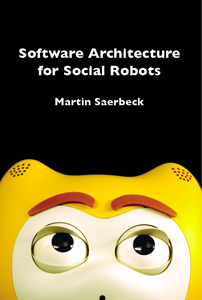Martin Saerbeck’s PhD thesis “Software Architecture For Social Robots” is now available online. Martin defended his thesis on December 10th, 2009. He did an excellent job at answering all the questions of the committee.
Category: Publication
The All-In Publication Policy
I presented my paper “The All-In Publication Policy” at the ICDS2010 conference. The video of the presentation is now available:
Abstract: The productivity of scientists and the quality of their papers differ enormously. Still, all papers written get published eventually and the impact factor of the publication channel is not correlated to the citations that individual papers receive. Hence it does not matter where to publish papers. Based on these two conjectures, I conclude that all papers should be published. The review process should focus on feedback that helps authors to improve their manuscripts. But we should no longer waste effort to a selection procedure. This All-In policy would decrease the number of published papers and would refocus the attention of the authors on the quality of their papers and not their quantity.
Costs and Benefits of Research Communication: The Dutch Situation
A recent study on the costs and benefit of research communication revealed that an open access strategy would safe the Netherlands millions of Euros per year. It is one of the first studies that even calculate the costs of writing funding proposals and the costs of total costs of publishing an article. Have a look at it for yourself: Costs and Benefits of Research Communication: The Dutch Situation.
New Publication: The asymmetry between discoveries and inventions in the Nobel Prize in Physics
We published a new article in the Technoetics Arts journal:
Bartneck, C., Rauterberg, M. (2008). The asymmetry between discoveries and inventions in the Nobel Prize in Physics. Technoetic Arts: a Journal of Speculative Research, 6(1), 73-77. DOI: 10.1386/tear.6.1.73_1
Abstract – This paper presents an empirical study on the frequency of discoveries and inventions that were awarded with the. More than 70 per cent of all Nobel Prizes were given to discoveries. The majority of inventions were awarded at the beginning of the twentieth century and only three inventions had a direct application for society. The emphasis on discoveries moves the Nobel Prize further away from its original intention to reward the greatest contribution to society in the preceding year. We propose to strengthen the role of inventions for the Nobel Prize, which would encourage inventors to tackle important problems, such as global warming or the gap between the first and the third worlds.
DOI: 10.1386/tear.6.1.73_1 | CITEULIKE: 2687653
HTML: http://www.bartneck.de/publications/2008/nobel/
The Godspeed Questionnaire Series
The web pages proposes a series of questionnaires to measure the users’ perception of robots. This series shall be called “Godspeed” because it is intended to help creators of robots on their development journey.
I collected all the available translations into this spreadsheet.
Below you find the English, Spanish, Dutch,Japanese, and Chinese version. Please email me your translations into other languages. The Spanish translation was contributed by Javier Ruiz-del-Solar. The Dutch and Chinese translation was contributed by Bram Vanderborght. The German translation was contributed by Mary Ellen Foster and Manuel Giuliani. The Arabic translation was contributed by Micheline Ziadee. Alexander Astaras translated the questionnaire to Greek. Wafa Johal provided the French translation. Carina Dantas provided the Portuguese translation. Franziska Kirstein provided the Danish translation. Elena Knox provided the Korean translation. Xose Xavier Rodriguez Rivera provided the Spanish, Catalan, Galician and Basque translations. Sofia Thunberg provided the Swedish translation.

